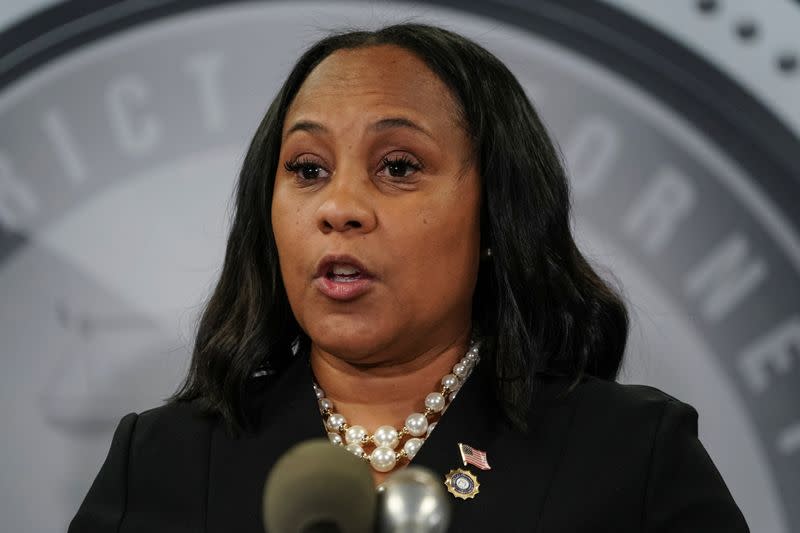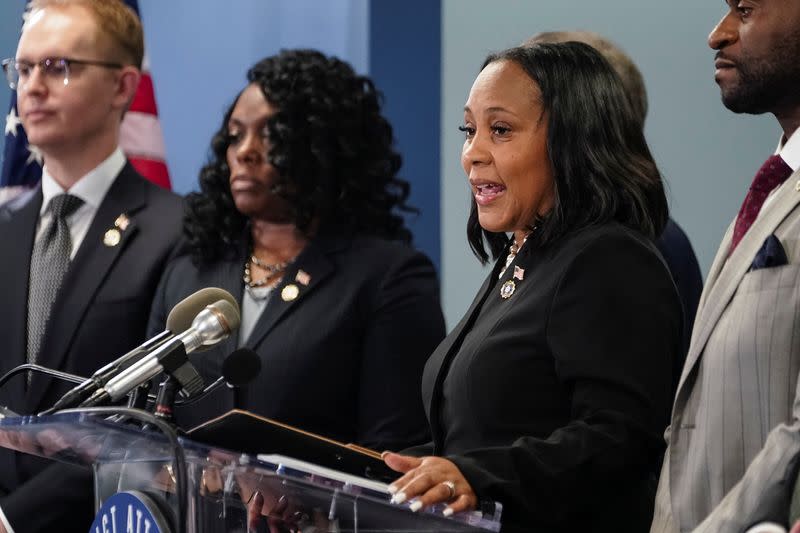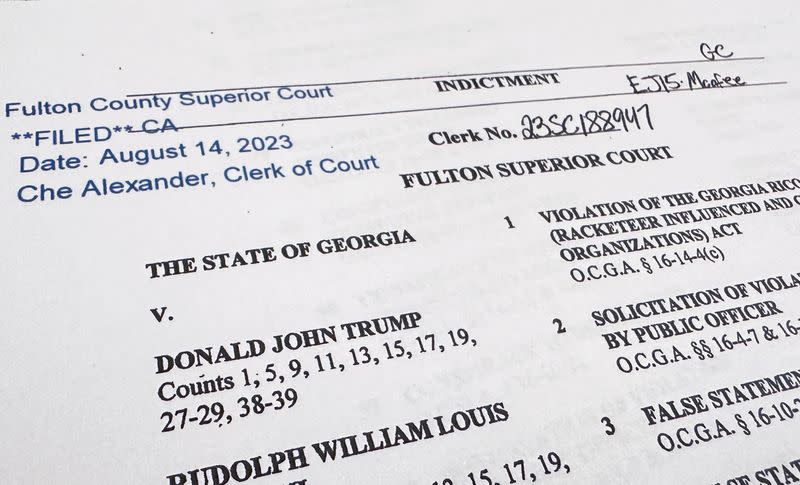Fani Willis, the steely Georgia prosecutor who charged Trump
- Oops!Something went wrong.Please try again later.
- Oops!Something went wrong.Please try again later.
By Andrew Goudsward and Tom Hals
WASHINGTON (Reuters) - The indictment of Former President Donald Trump for interfering in the 2020 presidential election in Georgia will be the biggest case of prosecutor Fani Willis' career, but it will not be her first contentious prosecution.
Willis, the Fulton County District Attorney who charged Trump with illegally trying to overturn his defeat under a law that prosecutors typically use against organized crime gangs, is known for her tenacity in pursuing criminal cases, at times drawing accusations in her community of overreach.
"Rather than abide by Georgia's legal process for election challenges, the defendants engaged in a criminal racketeering enterprise to overturn Georgia's presidential election result," Willis told a late night press conference after the indictment was filed.
Willis previously successfully led a high-profile prosecution of schoolteachers in Atlanta who cheated to improve the standardized test scores of their students and indicted well-known rappers for alleged gang activity.
“She’s not afraid of big cases,” said Gerald Griggs, a criminal defense attorney and president of the Georgia state conference of the NAACP. “She’s not afraid of going against popular opinion and public sentiment.”
The indictment of Trump, the front-runner for the Republican presidential nomination in 2024, is of a different magnitude for a prosecutor whose office is focused on local crimes in the Atlanta area. The case marks the fourth time Trump has been indicted this year.
But attorneys in Georgia said the case has a special resonance in a state with a history of voting rights battles and would endure even if Trump is elected president in 2024 and ends the federal prosecutions against him or pardons himself in those cases.
Willis, a Democrat and the first woman in the district attorney post, has faced a barrage of criticism and at times inflammatory attacks from Trump in the run-up to the indictment.
Trump, who has denied wrongdoing, has accused Willis of targeting him for political gain, called her a racist and criticized her handling of violent crime in Atlanta, Georgia's largest city and part of Fulton County.
Willis has brought to the election investigation the same apparent indifference to outside criticism that has defined her career as a prosecutor, according to lawyers who have worked with her.
"You are both wrong and confused," she wrote last year to a lawyer for Georgia Governor Brian Kemp, who called the election probe politically motivated. “Despite your disdain this investigation continues and will not be derailed by anyone’s antics.”
ANTI-MOB LAW
Throughout her career, Willis has made aggressive use of Georgia's anti-racketeering law, initially designed to target organized crime, which is the cornerstone of the indictment against Trump and his associates.
Georgia's racketeering law is more far-reaching than its federal counterpart, enabling charges against "corrupt organizations" if the prosecution can show they engaged in a pattern of criminal activity including two or more separate offenses.
The law was a central part of the prosecution in the Atlanta school cheating case and is also key to the ongoing case brought by Willis’s office against rapper Jeffery Lamar Williams, who performs as Young Thug, and 27 others linked to him who are accused of gang activity.
Willis has at times faced pushback from defense lawyers and activists who have accused her of being overzealous in bringing sweeping racketeering prosecutions. Willis has defended the cases as legitimate. In the teacher case, 11 of 12 defendants were found guilty of racketeering and conspiracy after a 2015 trial.
Jay Abt, a Georgia criminal defense lawyer who has represented witnesses in the election investigation, said he disagreed with Willis's use of the law, but added that her prosecutions are carefully considered.
“She’s extraordinarily professional,” Abt said. “She’s not someone who would take this lightly. She’s not flippant.”
‘BUILT FOR THIS’
Willis told South Atlanta Magazine in 2021 that she was raised primarily by her father, a criminal defense attorney who was a member of the Black Panther Party, a Black power movement that began in the 1960s.
She graduated from Howard University, a historically Black college in Washington, D.C., that Vice President Kamala Harris also attended, and Emory University School of Law in Atlanta before working as a criminal defense and family law attorney in private practice.
Willis worked from 2001 to 2018 in the Fulton County prosecutor's office, then won election as county prosecutor in 2020, defeating her former boss, Paul Howard. She faces re-election next year.
Willis campaigned on building leniency programs for some low-level offenders, but also adopted a hard line on violent crime and gang activity.
Griggs, the NAACP leader who worked with Willis at the start of his legal career, said she is adept at blocking out outside criticism in major prosecutions.
“She’s built for this,” Griggs said. “Anybody that thinks they can unleash insults from a podium and that’s going to shake Fani Willis is sorely mistaken."
(This story has been refiled with corrected picture captions)
(Reporting by Andrew Goudsward in Washington and Tom Hals in Wilimington, Delaware; Editing by David Bario and Alistair Bell)



